Background
In an act of preemptive strike,[1] Israel, on June 5, 1967, attacked and defeated its Arab neighbor states, and changed the geopolitics of the Middle East region forever. The Naksa (the Arabic word for setback) at the hands of Israel over the duration of just six days was a shameful military and political moment for Arabs.[2]
The reactive scenario of Arab governments was immediately on display. Licking their wounds, and fueled by "the complex of fear, the complex of defeat,"[3] the humiliated heads of Arab League countries met on August 29, 1967, in a summit that concluded with three no's: "no peace with Israel, no negotiations with Israel, no recognition of Israel."[4]
The "Three No's" principle that guided the official Arab response to the Naksa was clearly stated in the conclusion statement of the summit, known as the Khartoum Resolution,[5] in reference to the city where the meeting was held, the capital of Sudan, the same Sudan that signed the Abraham (normalization with Israel) Accords on January 6, 2021.[6]

Arab leaders, including Egypt's Gamal Abdel Nasser (second from right), at the Khartoum Summit, 1967 (Source: Economic Cooperation Foundation)
Sudan's evolutionary journey, from the Khartoum Resolution to the Abraham Accords, took more than five painful decades dominated by dictatorships and colored with hardships, and while Sudan's progress towards normalization with Israel is not the primary focus of this analysis, the destination of pragmatic peace is.
I use the term pragmatic peace as an equivalent alternative to normalization, because normalization may also mean cold peace (e.g., the Camp David Accords).[7] And by specifically describing peace as pragmatic, I emphasize the nature of peace as useful, workable, and practical.
Pragmatic peace is functional, not conditional. Pragmatic peace is adaptable, not stationary. Pragmatic peace is a realistic conviction,[8] not a naïve map.[9] Pragmatic peace is the possible could-dos, not the impossible must-dos.
Therefore, within the domain of this conceptual definition of normalization, I ask the following research question:
How is pragmatic peace with Israel demonstrated in the statements made by different Sudanese groups?
Method
To answer this research question, I operationalized a qualitative research design with a purposive sampling procedure. I was not concerned with sample representativeness, because purposive samples are common in qualitative research designs.[10] Through the purposive sampling procedure I employed, I collected data on what some Sudanese groups said regarding normalization with Israel within my definition of pragmatic peace.
I was mainly interested in specific, relevant statements delivered by members of some Sudanese groups. My focus was on finding these statements and then gaining a thorough understanding of them. In other words, my goal was to unpack these statements to obtain some explanation of the phenomenon of pragmatic peace between Sudan and Israel. Therefore, the sampling procedure of this qualitative research design is inherently purposive.
The sample consists of qualitative data. It is a collection of online content, both written and visual, which represents 16 multimedia texts about 13 Sudanese figures. I accessed these texts through the rich digital archive of the Middle East Media Research Institute (MEMRI),[11] clicking on the hamburger icon, the "Projects" tab, and then "The Reform Project" tab.
The textual analysis is not organized chronologically. It is driven by narrative. It consists of three sections, each refers to a different Sudanese group: "State Leaders and Government Officials," "Political Figures and Analysts," and "Journalists, Writers, and Activists."
While the analysis ends with the section, "Policy Recommendation," I acknowledge that Sudan's internal situation remains extremely volatile and tremendously fragile, as it has been the case since the overthrow of the Omar al-Bashir dictatorship in 2019, but particularly since the October 25, 2021, political crisis.[12]
State Leaders And Government Officials
General Abdel Fattah Al-Burhan, commander-in-chief of the Sudanese Armed Forces and the de facto head of the State of Sudan, told the Al-Arabiya network[13] (Saudi Arabia) that his country "can have normal relations with Israel, just like any other country" and that "[eventually], the ties [with Israel] will assume their natural form."
He said that "[Sudan's] military doctrine has nothing to do with Israel," because "we do not bear hostility towards anyone, we want to prove to the world that we are open, and it is not in our best interest to be hostile towards any religion, nation, or anyone."
Al-Burhan sees that "the issue of Sudan's ties with Israel was essential to enable Sudan's return to the international community [i.e., pragmatic peace]."
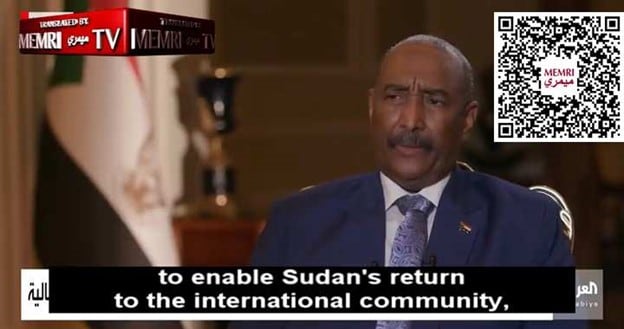
Abdel Fattah Al-Burhan, commander-in-chief of the Sudanese Armed Forces. (Source: MEMRI)
Sudan's return to the international community appears to be the motive of Al-Burhan's pragmatic support to normalization with Israel. He told France 24[14] that Sudan's normalization with Israel is "reconciliation with the international community, [because Israel is] a part of the international community."
Playing on this same pragmatic rhythm, Al-Burhan told Sudan TV:[15] "When we talk about lifting sanctions on Sudan, we cannot isolate it from the normalization of relations with Israel. I always prefer to call it 'reconciliation' rather than 'normalization.' We are now making a reconciliation agreement. Reconciliation is legitimate, even with enemies. You can sign a reconciliation [agreement] with anyone, if it serves the interests of both parties."
In that same interview with Sudan TV, Al-Burhan commented on Sudan's evolutionary journey from the Khartoum Resolution (i.e., the complex of fear, the complex of defeat) to the Abraham Accords (i.e., pragmatic peace): "The [Khartoum] 'Three No's' Summit was in 1967. Everything has changed since. How many agreements have been signed since 1967? There have been many agreements between Israel and Arab countries or the PLO. Everything has changed, but we still say that we are living in 1967. Why should we stay in 1967 and bear the consequences of shackling ourselves to the same position ever since?... We do not want the Sudanese people to bear the brunt of this responsibility all alone."
Apparently, Sudanese officials know what Sudan wants to achieve through pragmatic peace with Israel, but they also know what they have to offer in return.
Haider Badawi Sadiq, former Sudanese Foreign Ministry spokesman, said in a televised interview on the Al-Jazeera network (Qatar)[16] that "we can offer Israel, as part of the world, a model for peace... we want to become makers of world peace."
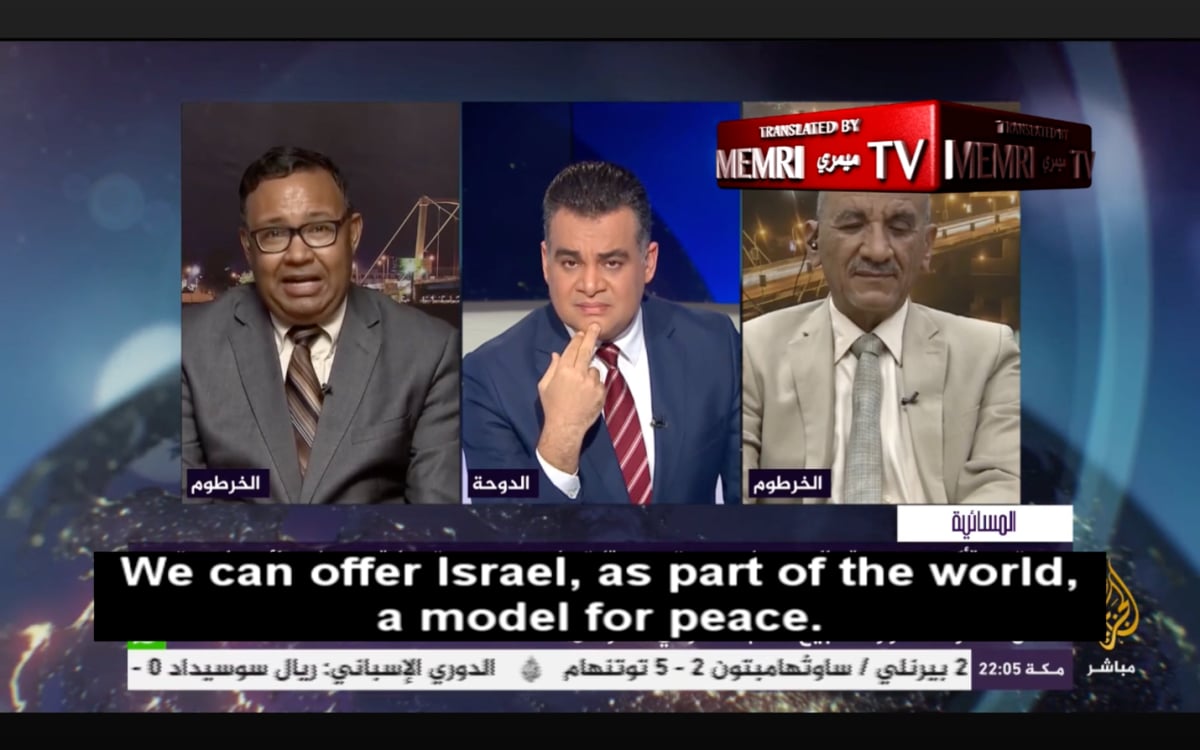
Former Sudanese Foreign Ministry spokesman Haider Badawi Sadiq, on left. (Source: MEMRI)
This offer is attractive, because "the remarkable tale of Sudan turning from a symbol of the Arab world's rejection of the Jewish state, into its latest potential peace partner,"[17] is impactful strategically, but also mentally and emotionally, and Sadiq explained that Sudan does "not want to be held captive" by the past and wants to "help our region flourish through peace."
Regional prosperity was also on the mind of Sudanese economist and politician Mubarak Al-Fadil Al-Mahdi, former Deputy Prime Minister of Sudan and currently the head of the Umma Party (Reform and Renewal, UPRR), when he spoke in an interview on Alghad TV (Egypt/UAE):[18] "Marrying Arab [Gulf oil] money with Western- and American-inspired Israeli technological capabilities can be of great economic benefit to our Arab region... which will open new horizons for a comprehensive [pragmatic] peace."

Former Sudanese deputy prime minister Mubarak Al-Fadil Al-Mahdi, the current head of the Umma Party (Reform and Renewal, UPRR) (Source: MEMRI)
But Al-Mahdi's vision for Sudan's pragmatic peace with Israel is above and beyond any temporary benefits: "[Sudan's] move in that direction... will... change the political map in the region and will open new economic and political horizons that will bring stability to the region. It will create new military and economic alliances that will confront the regional challenges of the sectarian Iranian expansion, as well as the spread of Islamic extremism.
Al-Mahdi clearly sees the valuable strategic contribution Sudan can offer to regional stability and security: "Iran is expanding in this region and is threatening the Bab el-Mandeb Strait and the waterways used by the oil tankers and other vessels. It threatens stability in the region in general... Sudan can play a key [strategic] role in this new alliance... [with]... Israel, against the security challenge of terrorism and extremism, as well as the sectarian Iranian expansion."
However, he also foresees a disastrous scenario if Sudan's commitment to normalization with Israel fails: "[Ending] Sudan's international isolation... is dependent on ending the enmity with Israel... So the two things are connected. You cannot have [the] sanctions lifted without ending the enmity with Israel... [Otherwise], we will not be able to get debt relief for Sudan..., and we will not be able to return to the international financing institutions, and to achieve the required economic stability."
Al-Mahdi echoed this same pragmatic tone in an interview with the London-based Saudi daily Asharq Al-Awsat, in which he said Sudan needs "a 'certificate of innocence' clearing it of the terrorism charges [against it], which Israel can grant on a silver platter."[19]
Political Figures And Analysts
Abdul Wahid Al-Nur, the founder and leader of the Sudan Liberation Movement (SLM-AW, the remaining Darfur rebel faction that is still to sign a peace agreement with Khartoum), told France 24 that he has visited Israel "time and again."[20]
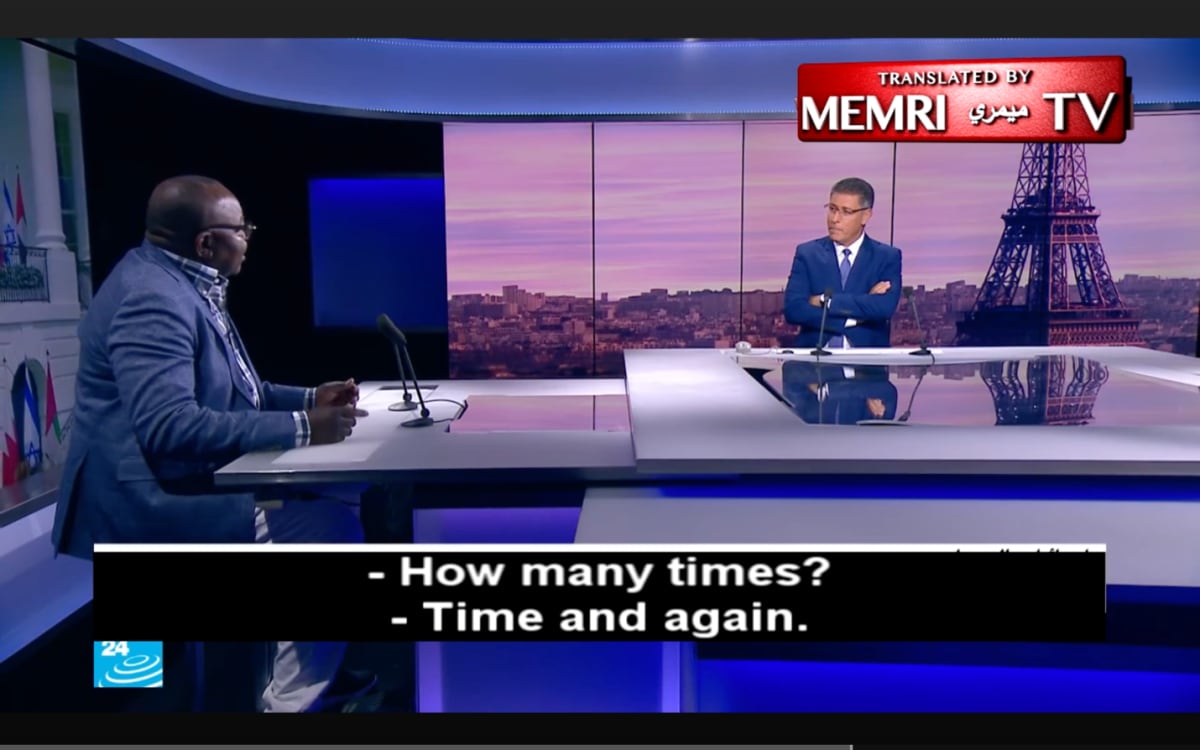
Sudan Liberation Movement, SLM-AW founder and leader Abdul Wahid Al-Nur (left) (Source: MEMRI)
Explaining his vision of Sudan's pragmatic peace with Israel, he said, "We [Sudanese] should resolve our own problems. We should care about our own country... a billion times more."
"We [Sudanese] should care, first and foremost, about the cause of Sudan," Al-Nur added.
Within this same pragmatic approach, and in a debate aired on Sudan TV,[21] Saleh Mansour, an official from the Sudan Liberation Movement, questioned the return on Sudan's investment in the Arab-Israeli conflict: "What have the Sudanese people gained from our hostility towards Israel since 1967? And what reasons do we have to fight against Israel? Honestly, the interests of Sudan are the most important thing. [We should strive for] balanced and equal relations with all the countries in the world. We are not isolated from the international community."
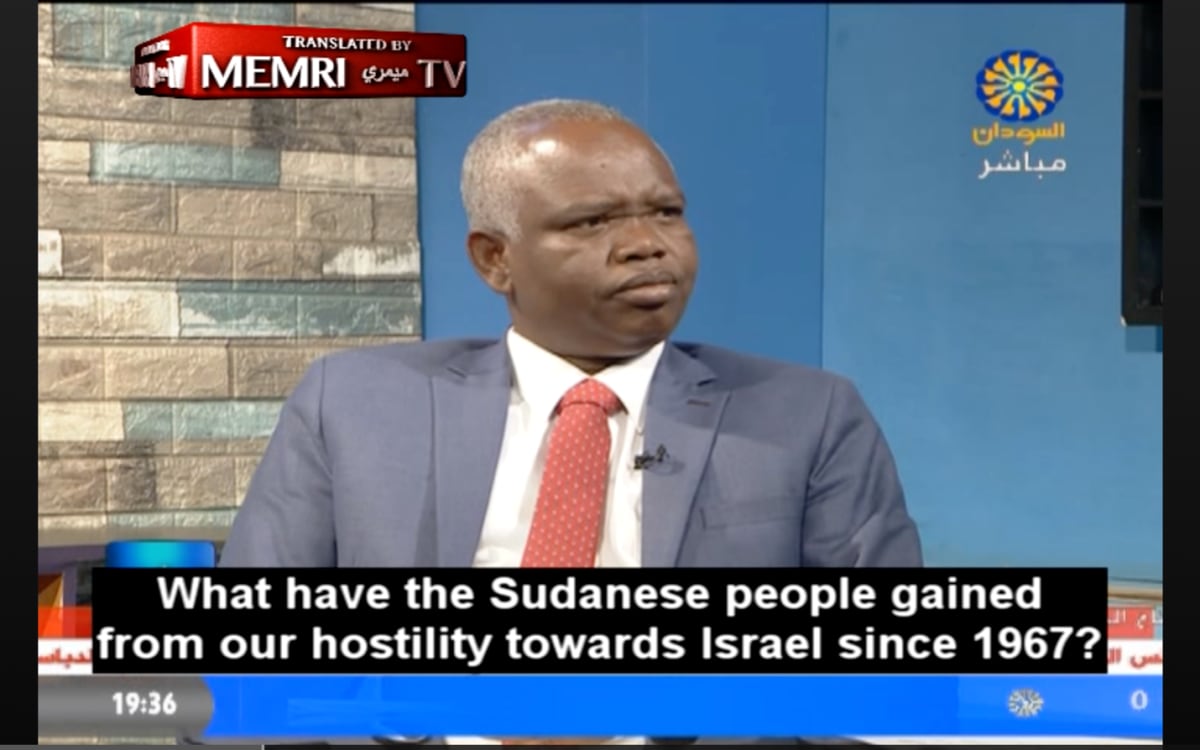
Saleh Mansour, Sudan Liberation Movement official (Source: MEMRI)
SUPPORT OUR WORK

He unreservedly called for "peace, peace, peace!," explaining that "if there is no [pragmatic] peace, whatever we gain will be invested back in the war."
For Mansour, "[pragmatic] peace is a basic need... [because] 80% of the country's budget is allocated to war. No matter what our budget is, we cannot benefit from it. Peace means agriculture, irrigation, and industry."
He admitted the mistakes of the past: "[Sudan] caused problems for Israel, and Israel caused problems for Sudan because of the mistakes we [Sudanese] made. Why should we make the same mistakes again?"
But Mansour also showed that the lessons of the past have been well-learned: "We care about the Sudanese nation. We are Sudanese. The interests of Sudan should come first, before everything."
Mansour puts Sudan first, and so does Mohammadain Mohammad Ishaq, the spokesman of the Sudan Liberation Army – Transitional Council (which split from SLM-AW and made peace with the Khartoum government).
In an interview on Sudan TV,[22] Ishaq said: "Many people's opposition [to normalization with Israel] stems from their ideological-Islamist understanding..., without taking into account the interests of the Sudanese people."
Elaborating on his full support to Sudan's pragmatic peace with Israel, Ishaq said that "there are no objections whatsoever to this. We all agree to the normalization with Israel. We consider this to be a very important step in the building of modern Sudan."

Sudan Liberation Army – Transitional Council spokesman Mohammadain Mohammad Ishaq, on left. (Source: MEMRI)
Building a modern, peaceful Sudan is a goal also shared by Sudanese political analyst Muhammad Adam. In a televised interview on Russia Today,[23] he said: "We will not pay the price or bear the consequences of other people's mistakes. The Sudanese people must join this [peace] path in a way that will yield real [pragmatic] results in order to establish friendly relations with Israel."
Looking back at the past, Adam asked: "What have we gained from [all the] years of boycotting Israel and other countries? We have reaped nothing but ruin, destruction, and the slowing down and even collapse of our country."

Sudanese political analyst Muhammad Adam (Source: MEMRI)
Then he looked at the present and said, "There is no doubt that today the Sudanese no longer talk about Israel being a plundering country and so on. This nonsense, this broken record, is a thing of the past."
But despite all the pain and losses, Adam remains optimistic. "The time of wars and conflicts is over. Today, we live in an era of peace, of brotherhood, and of establishing mutual ties and interests with Israel."
Sudan's interest in pragmatic peace with Israel is clearly specified by Sudanese researcher Al-Baqer Al-Afif. In a debate aired on Al-Jazeera TV (Qatar),[24] Al-Afif said: "Our main concern is to return to this world. If the price of this is normalizing relations with Israel, and if this will ensure that these very important goals are realized, then we welcome it."

Sudanese researcher Al-Baqer Al-Afif (Source: MEMRI)
In a more detailed terms, Al-Afif added: "I am talking about debt relief, about removing Sudan from the list of countries that support terrorism, about the return of investments into Sudan, about technological aid, about opening the gates of the international banks for cooperation with Sudan in order to revive the Sudanese economy and to help us take care of our problems.
Explaining that Sudan's pragmatic peace with Israel is justified, Al-Afif said: "The illiteracy rate [in Sudan] has now risen to 60%. According to official statistics, 65% [of Sudanese people] live in poverty."
Perhaps statistics like these have made some Sudanese political-Islamists think (and rethink) pragmatically about Israel, the Jewish State. In an article published in the independent Sudanese daily Akhir Lahza, Sudanese oppositionist and cleric Yousuf Al-Koda, who also heads the Al-Wasat Islamic Party, wrote:[25] "What have we achieved by [boycotting Israel]? Is this a boycott for its own sake, or does it have a specific goal, namely to pressure Israel to comply [with certain demands]? [If so,] none of this has been achieved."
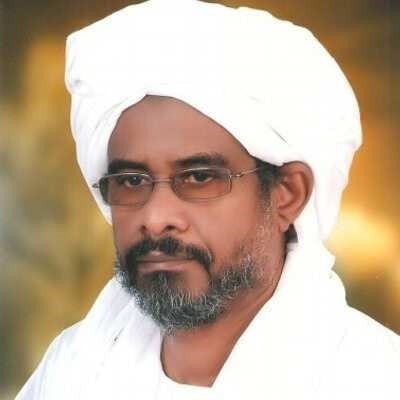
Sudanese oppositionist and cleric Yousuf Al-Koda, head of the Al-Wasat Islamic Party (Source: MEMRI)
He called for establishing pragmatic peace with Israel: "We must therefore take stock and assess all the past years of boycott, assuming that the boycott is not an end in itself... [Accordingly], there is no choice but to abandon the useless boycott and turn to [the option of] establishing ties with Israel.
Journalists, Writers, And Activists
Following the announcement that Sudan and Israel had decided to normalize relations, Sudanese columnist Osama Di Al-Naim Muhammad wrote an important column in Sudan's Al-Rakoba newspaper reflecting on how the Arab-Israeli conflict had damaged Sudan.[26] In it, he stated:
"We Sudanese have lost [certain] interests and our wound is still bleeding. We lost 90% of our state's income... [and we could not] prevent the secession of South Sudan." Therefore, he continued, Sudan's peace with Israel is pragmatic, aiming to follow the example of countries that "increase their [gross] national product [and] cultivate industry and trade that are a model for the world."

Sudanese columnist Osama Di Al-Naim Muhammad (Source: MEMRI)
Muhammad explained that "the enemies of yesterday [could] coexist, trade [with one another], and cooperate on mutual interests. The [economic] competition between them increases their [gross] national product and the wellbeing of their citizens."
He conclusively predicted that a country "cannot become an economic force with global influence except by [embracing] peace instead of the tools of war and extermination."
Criticizing those Sudanese who oppose normalization with Israel, he said that the path that they have taken "does not reflect wisdom or any lesson learned... Nor are they applying the lesson learned [if any]." He told them: "Enough with the slogans of throwing Israel into the sea and wiping it out of existence... [and] fighting and more fighting, and [the policy of] the three No's that was sadly drafted in [the Sudanese capital of] Khartoum."
He concluded by drawing an image for a different Sudan, a country that has evolved from the illusion of the Khartoum Resolution to the pragmatic peace of the Abraham Accords: "Israel, we welcome you to Khartoum. The Land of the Three No's has changed its tune to three times Yes: Yes to Israel, yes to an alliance with it, and yes to normalization with it."
However, former Sudanese Member of Parliament Abu Al-Qasim Bortom does not only want Sudan to achieve peace with Israel, but he also wants that achievement at a faster pace and a deeper level. Bortom is known locally for having called for an opening towards Israel as far back as 2015 and, therefore, he decided to act. He created an initiative to delegate Sudanese citizens in a cultural visit to Israel. In a televised interview with the Al-Arabiya network (Saudi Arabia),[27] Bortom said: "The purpose of this initiative is to accelerate the normalization with Israel... We were in touch with a large number of [Israeli] NGOs and popular groups, and they all welcomed this [proposed] visit warmly... We received very welcoming responses from a group of Israeli NGOs.
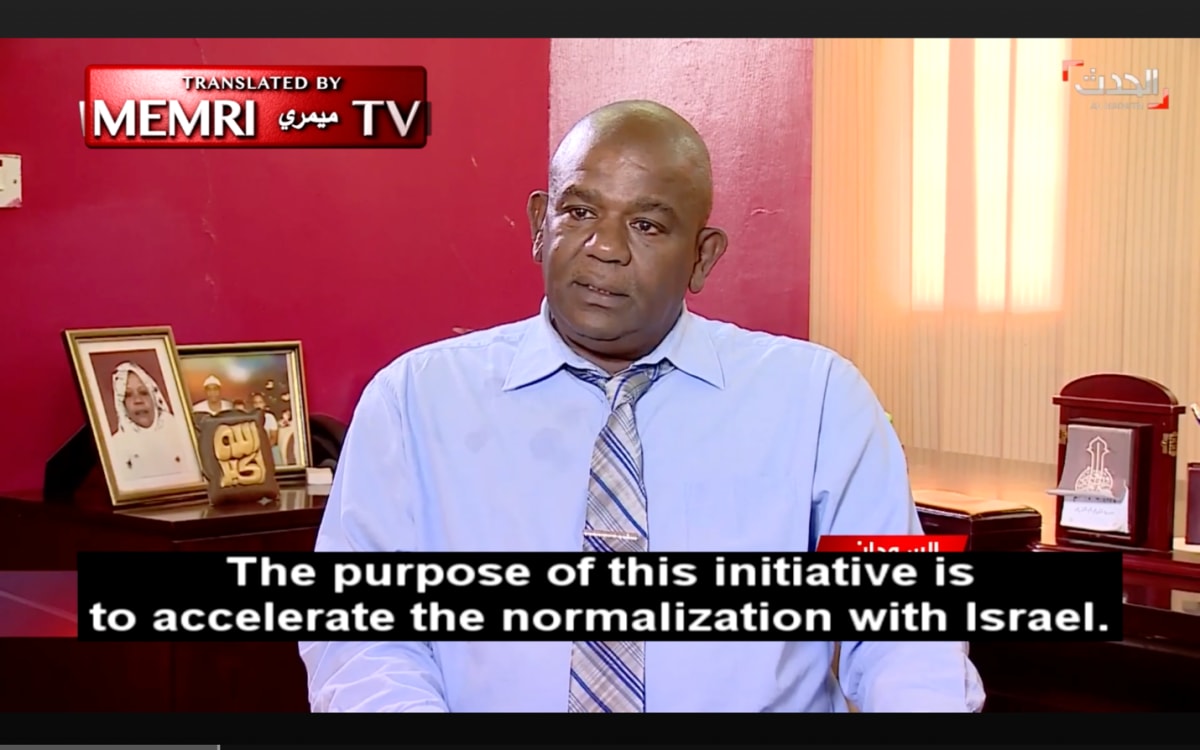
Former Sudanese Member of Parliament Abu Al-Qasim Bortom (Source: MEMRI)
On the other side, Bortom added, "a large number of [Sudanese citizens], over 1,000," are eager to travel to Israel as part of this initiative.
Another purpose of this initiative, he added, is "to break the psychological barrier, caused by [all the] years of plundering the Sudanese citizens, in the name of fighting Israel."
For Bortom, pragmatic peace between Sudan and Israel is humanistic: "This is a humanistic-cultural visit that has nothing to do with economy or politics... I am completely convinced that the issue with Israel is political... [This] political issue has caused Sudan a lot of problems that we are all aware of... As Sudanese, we have no enmity towards Israel."
But if the peace process between Sudan and Israel is humanistic, "what prevents Sudan from establishing relations with Israel?" This is one question in a series that Sudanese journalist Awadallah Naway asked in a televised interview on Russia Today:[28] "Is there a war between Sudan and Israel? Does Sudan share a border with Israel?... [Why do] we want to entrench ourselves in the "Three No's Summit"?
His answers to his own questions show a mature level of thinking: "Sudan is not an Arab country... [and this] is not a religious issue... Sudan will be able to benefit from [Israel's] agricultural technology... [There] is a Sudanese cause that seeks resolution. The Sudanese cause is [pragmatically] about benefiting from [Israel's] great agricultural resources, and about signing of agreements [with Israel]."
Naway said that his opinions on peace with Israel are not marginal within the Sudanese general population: "I can guarantee that the majority of Sudanese are looking forward to the building of [pragmatic] relations [with Israel] that will serve their interests. How is a foreign policy built? According to the interests of countries."

Sudanese journalist Awadallah Naway (Source: MEMRI)
Obviously, these pragmatic interests are emotionless. In the words of Sudanese journalist Mahjoub Othman, who spoke about the normalization of relations between Sudan and Israel on Sudan TV,[29] "there is nothing wrong with having relations with Israel if they benefit the Sudanese... The opposition to normalization with Israel is [emotional and] not based on logic. I believe that establishing relations with Israel at this time... will mean a great deal for Sudan."
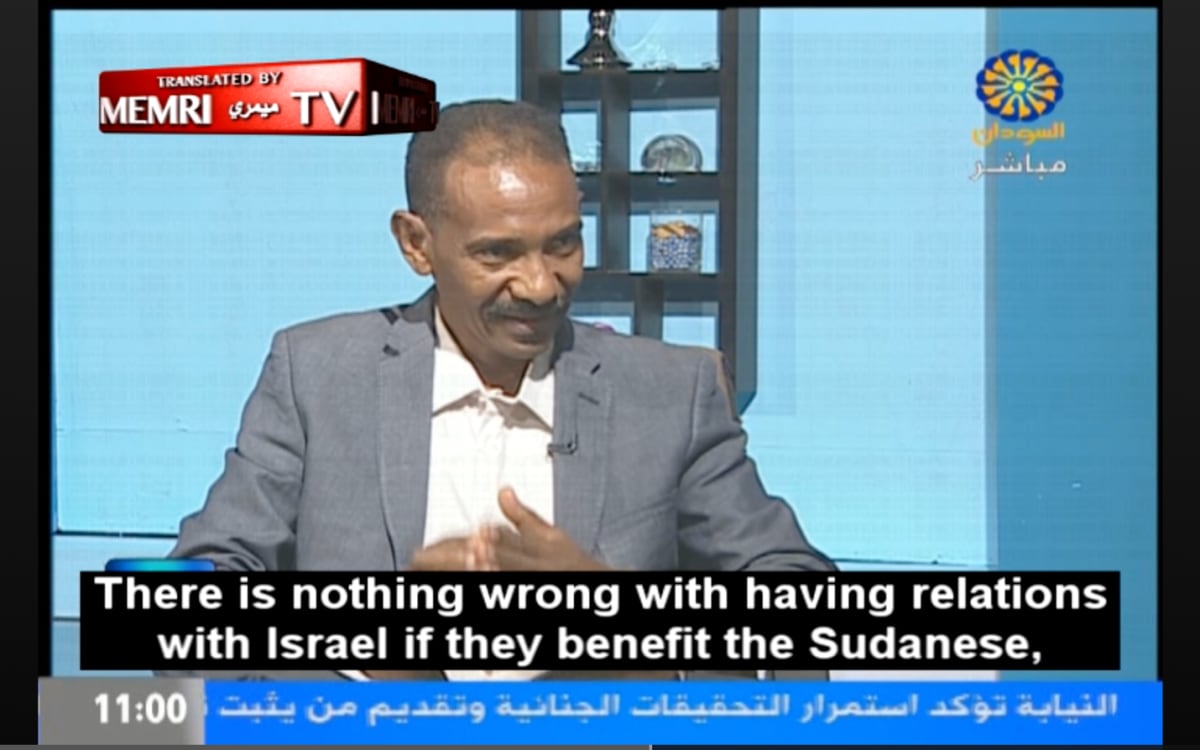
Sudanese journalist Mahjoub Othman (Source: MEMRI)
Policy Recommendation
In this study, I ran a purposive analysis of texts obtained from MEMRI's rich digital archive to examine how pragmatic peace with Israel is demonstrated in the statements made by Sudanese state leaders and government officials, political figures and analysts, and journalists, writers and activists.
I found that pragmatic peace is demonstrated as useful, workable, and practical. The Sudanese in the sample are "talking about debt relief, about removing Sudan from the list of countries that support terrorism, about the return of investments into Sudan, about technological aid, about opening the gates of the international banks for cooperation with Sudan in order to revive the Sudanese economy and to help [them] take care of [their] problems."[30]
Sudan has come a long way, from the ashes of the Khartoum Resolution to the promises of the Abraham Accords. The Sudanese in the sample think this evolutionary journey "will create new military and economic alliances that will confront the regional challenges of the sectarian Iranian expansion, as well as the spread of Islamic extremism," and they explain that "Sudan can play a key [strategic] role in this new alliance... [with]... Israel, against the security challenge of terrorism and extremism, as well as the sectarian Iranian expansion."[31]
While the possibilities for international peace and regional reconciliation are still tantalizing, a cloud now hangs on the horizon since the October 25, 2021, military coup that gave General Al-Burhan greater power over Sudan's transition to democracy scheduled for 2023. Support or opposition to the military and its November 2021 pact with a seemingly weakened Prime Minister Abdalla Hamdok led to fierce opposition by important elements of Sudan's civil society and popular movements. This opposition to military hegemony and skepticism about the generals' agenda have complicated the vision of Sudan's possible future relations with Israel. Some will indeed still see a Sudanese opening towards Israel as commonsense, but others will see it as a cynical ploy by the Sudanese military to curry favor with the international community at the expense of domestic public opinion. In a sense, peace with Israel has been subsumed into the larger, unresolved and murky issue of Sudan's own progress towards democracy and the question of the role of the military – of Sudan's own peace with itself.
However, evidence obtained in this analysis supports the argument that Sudan, in many ways, has learned from the lessons of the past, as far as international relations go. Today, many Sudanese understand that by "boycotting Israel" they "have reaped nothing but ruin, destruction, and the slowing down and even collapse of [their] country."[32] Therefore, it is now the historic responsibility of Israel, the international community (specifically, the United States of America), and regional powers to not squander this opening with Sudan, but at the same time, be extremely careful of local sensitivities and a volatile internal situation.
Author's Note: I would like to thank Ambassador Alberto M. Fernandez, MEMRI Vice President, former Coordinator for Strategic Counterterrorism Communications (CSCC) at the U.S. Department of State, and former Chargé D'affaires of the U.S. Embassy in Khartoum, Sudan, for his valuable contribution to this study.
*Mohammed Hayder is a freelance researcher and writer based in the U.S.
[1] Hoover.org/research/preemptive-strikes-and-preventive-wars-historians-perspective, August 29, 2017.
[2] Bbc.com/news/world-middle-east-39960461, June 5, 2017.
[3]Youtube.com/watch?v=PFWjJaRyoxg, uploaded January 18, 2016.
[4] Ecf.org.il/issues/issue/141.
[5] Ecf.org.il/issues/issue/513.
[6] Bloomberg.com/news/articles/2021-01-06/sudan-signs-abraham-accords-declaration-with-u-s-cabinet-says, January 6, 2021.
[7] Wsj.com/articles/as-arab-states-recognize-israel-egypts-cold-peace-points-to-challenges-11608139981, December 16, 2020.
[8] Washingtonpost.com/opinions/american-politics-could-use-a-healthy-dose-of-pragmatism/2019/08/02/6ea550c4-b540-11e9-951e-de024209545d_story.html, August 2, 2019.
[9] MEMRI Special Dispatch No. 9675, New Palestinian Embassy Building In Tunisia Features Giant Marble Map Of Palestine From The River To The Sea, December 10, 2021.
[10] Lindlof, T. R., & Taylor, B. C. (2002). Qualitative communication research methods. (2nd ed.). Sage Publications. ISBN-13: 978-0761924944
[11]www.MEMRI.org.
[12] Nbcnews.com/news/world/sudans-army-detains-pm-officials-apparent-coup-rcna3688, October 25, 2021.
[13] MEMRI Special Dispatch No. 9224, General Abdel Fattah Al-Burhan, Sudan's Transitional Leader: Sudan Intends To Establish Full Relations With Israel; We Are Not Hostile To Any Nation Or Religion, December 3, 2021.
[14] MEMRI TV Clip No. 8848, Abdel Fattah Al-Burhan, Chairman Of Sudan's Sovereignty Council: What Is Happening In Gaza Is Sad But This Has Nothing To Do With Sudan's Normalization With Israel, May 17, 2021.
[15] MEMRI TV Clip No. 8396, Abdel Fattah Al-Burhan, Chairman Of Sudan's Sovereignty Council: Reconciliation With Israel Serves The Interests Of Both Parties; Many Other Arab-Israeli Agreements Have Been Signed Since The 1967 'Three No's' Khartoum Summit, October 26, 2020.
[16] MEMRI TV Clip No. 8314, Former Sudanese Official Haider Badawi Sadiq: I Cannot Deny That Sudan Is Willing To Negotiate Normalization With Israel; We Want World Peace, September 21, 2020.
[17] Timesofisrael.com/yes-yes-yes-why-peace-with-khartoum-would-be-true-paradigm-shift-for-israel/, October 23, 2020.
[18] MEMRI TV Clip No. 8227, Sudanese Politician Mubarak Al-Fadil Al-Mahdi Praises UAE-Israel Relations: Sudan Should Follow Suit; An Arab-Israel Alliance Could Confront Iran, Islamic Extremism, August 19, 2020.
[19] MEMRI Special Dispatch No. 8555, Sudanese Politician In Saudi 'Asharq Al-Awsat' Daily: Sudanese People Support Normalization With Israel; Arabs' Policy Of Refusal Has Only Hurt Them, February 13, 2020.
[20] MEMRI TV Clip No. 8430, Sudan Liberation Movement Leader Abdul Wahid Al-Nur On Normalization With Israel: Pan-Arabism Is A Lie; We Should Solve Our Own Problems Before Worrying About The Palestinian Cause, October 26, 2020.
[21] MEMRI TV Clip No. 8399, Sudan TV Debate – SLM Official Saleh Mansour: We Need Peace; People Are Tired; We Have Gained Nothing From Hostility Towards Israel; Ba'ath Politician Al-Bakheet Omar: The Zionists Are Implementing The Protocols Of The Elders Of Zion, October 25, 2020.
[22] MEMRI TV Clip No. 8407, Sudanese Politician Mohammadain Mohammad Ishaq: We Have No Enmity Towards Israel; We Need To Abandon The Islamist, Pan-Arab Ideologies; The Palestinians Are Better Off Than Rural Sudanese, October 25, 2020.
[23] MEMRI TV Clip No. 8388, Sudanese Political Analyst Muhammad Adam: The Time Has Come To Establish Relations With Israel; We Will Not Pay The Price For Other People's Mistakes, October 15, 2020.
[24] MEMRI TV Clip No. 8361, Sudanese Researcher Al-Baqer Al-Afif: Our Normalization With Israel Will Lead To Normalization With The U.S.; Palestinian Refugees Are Much Better Off Than Sudanese Refugees, October 1, 2020.
[25] MEMRI Special Dispatch No. 7109, Sudanese Cleric Defends Investment Minister's Call To Normalize Relations With Israel, September 26, 2017.
[26] MEMRI Special Dispatch No. 8997, Sudanese Writer: 'Israel, We Welcome You To Khartoum,' October 29, 2020.
[27] MEMRI TV Clip No. 8359, Former Sudanese MP Abu Al-Qasim Bortom, Organizer Of Planned Citizens' Delegation To Israel: The Purpose Is To Accelerate Normalization With Israel, October 12, 2020.
[28] MEMRI TV Clip No. 8230, Sudanese Journalist Awadallah Naway: There Is No Reason For Sudan To Not Establish Relations With Israel; We Only Stand To Gain From This, August 19, 2020.
[29] MEMRI TV Clip No. 8634, Sudanese Journalist Mahjoub Othman: Sudan And Its Citizens Stand To Gain From Normalization With Israel; 'The Opposition To Normalization With Israel Is Not Based On Logic,' December 29, 2020.
[30] MEMRI TV Clip No. 8361, Sudanese Researcher Al-Baqer Al-Afif: Our Normalization With Israel Will Lead To Normalization With The U.S.; Palestinian Refugees Are Much Better Off Than Sudanese Refugees, October 1, 2020.
[31] MEMRI TV Clip No. 8361, Sudanese Politician Mubarak Al-Fadil Al-Mahdi Praises UAE-Israel Relations: Sudan Should Follow Suit; An Arab-Israel Alliance Could Confront Iran, Islamic Extremism, August 19, 2020.
[32] MEMRI TV Clip No. 8388, Sudanese Political Analyst Muhammad Adam: The Time Has Come To Establish Relations With Israel; We Will Not Pay The Price For Other People's Mistakes, October 15, 2020.




